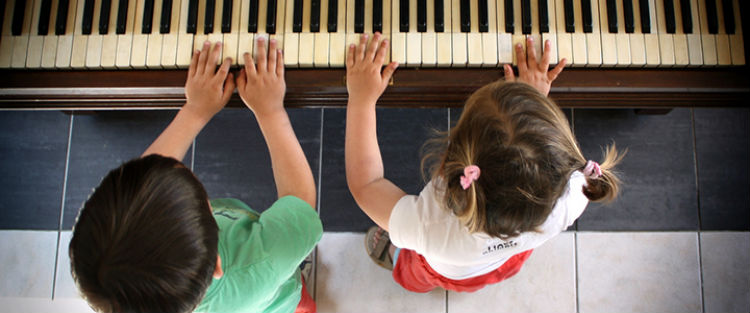You’re diligently paying for weekly music lessons, but your kid’s instrument sits idle during the days in between. Whyyyy!!!? Here, one expert shares the most common mistakes among parents (even the most well-intentioned) — and what you should do instead.
By Haley Burress
If you are struggling to get your child to practice their instrument daily, you might be approaching it the wrong way. Here are the top five mistakes that Kenny says many well-meaning parents make and what to do instead to encourage musical practice at home.
Mistake 1: You chose the instrument or musical style for them.
Kids are more likely to enjoy their musical experience if they are allowed to choose their own instrument and musical style. Sure, you may have had dreams of playing piano duets with your child, but if your kiddo loves the saxophone instead, let him give it a try. The same holds true for musical styles; your jazz-loving daughter might never want to be a classical flautist. So let her explore her love for jazz. When encouraged to make their own choices, your children are more likely to welcome practice and develop a love for music in general.
Find Music Classes Near You Now >>
Mistake 2: You don’t schedule practice time.
Kenney encourages parents to schedule musical practice time into the family calendar. Just like homework, music practice shows the greatest results when done daily, and the teachers at CSMA recommend at least 15 to 30 minutes of practice time each day for children starting out with their instrument. Without a scheduled time in the family rhythm, practice will likely get pushed out of the day entirely. And don’t let your child convince you that band practice at school counts as his practice time, says Kenney, individual practice at home is the key to getting better and seeing results.
Mistake 3: You refuse to be flexible.
With all that scheduling of practice time, parents should also remember to be flexible and read their child. If your child is not concentrating during music practice or seems to be extra frustrated, take a moment to assess the situation. Will some outside play time help burn off the extra energy, or will a snack help improve concentration? Practice should be an overall good experience, and if that time is often ending in tears or screaming, your child will end up hating his musical instrument.
Mistake 4: You hover during practice times. A lot.
Practice time is not the best time for parents to sit and watch over their children. As with homework, it is wise to be readily available for help or to stay in touch with your child’s experience, but let your child work independently. Praise them when you hear something great or when you know that they are working hard. Encourage them to keep going if you feel them getting frustrated. But unless they request help, let them practice on their own. Kenny reminds parents to pay attention to the feedback that your child needs to succeed and stay on course. “You know your kids best — if they like to work independently and without help from adults, let them do so. In contrast, give a little extra help to children that require more of a hands-on approach.”
Mistake 5: There isn’t a consequence for not practicing.
Daily practice shouldn’t be optional at your home, and there should be consequences for skipping practice sessions. Kenney recommends establishing a family routine that includes both homework and music practice before evening screen time. If you aren’t sure if you child is practicing as he should be, his music instructor will be able to tell. Be sure to communicate and share expectations with your child and with your child’s instructor so that everyone is working toward the same goal.
Remember: Parents Need to “Practice” Patience, Too
When your child resists music practice at home, try to manage your frustration. Some pushback from kids is normal. However, with a few additions to your family schedule and some minor modifications to your practice-time philosophy, you should be able to decrease the whining within just a few weeks. Even better, your child will start to see the slow and steady results after consistent daily practices, which will benefit him in the music world and well beyond. Good luck!
This Will Be Music to Your Ears
Now it’s easier than ever to find a new music school for your child! ActivityHero offers thousands of listings, and we can show you the providers in your neck of the woods, along with their current class schedules.

